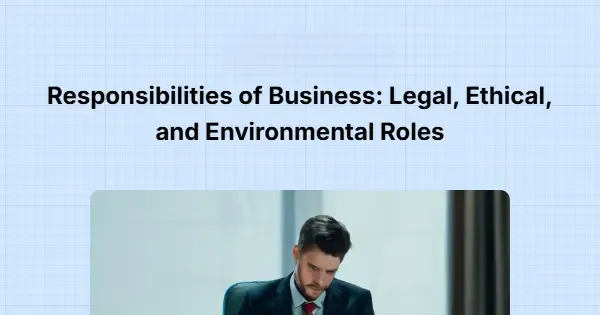
Responsibilities of Business
1. Legal and Ethical Compliance:
Adhering to the laws and regulations governing the industry and region in which the business operates .Conducting business with integrity and adhering to ethical standards.
2. Economic Responsibility:
Generating profits and economic value for shareholders and other stakeholdersContributing to economic development through job creation and innovation.
3. Social Responsibility:
Contributing to the well-being of society by addressing social issues and supporting community development.Engaging in philanthropy and supporting charitable initiatives.
4. Environmental Responsibility:
Minimizing the environmental impact of business operations.Adopting sustainable practices and promoting environmentally friendly technologies
5. Customer Satisfaction:
Providing high-quality products or services that meet customer needs. Ensuring fair business practices and transparent communication with customers.
6. Employee Welfare:
Providing a safe and healthy work environment. Offering fair wages, benefits, and opportunities for professional development. Promoting diversity, equity, and inclusion within the workplace
7. Supplier and Partner Relations:
Building fair and mutually beneficial relationships with suppliers and business partners. Ensuring ethical sourcing and supply chain practices.
8. Innovation and Research:
Investing in research and development to foster innovation. Contributing to technological advancements and the overall progress of society.
9. Transparency and Accountability:
Maintaining transparency in financial reporting and business practices.Taking responsibility for the consequences of business actions.
10. Stakeholder Engagement:
Actively engaging with and considering the interests of various stakeholders, including employees, customers, investors, and the local community.
Environmental Protection Responsibilities of Business:
Business organizations worldwide can adopt the following measures to curb environmental pollution and safeguard the environment:
- Businesses engaged in manufacturing can adopt green technologies that are environmentally friendly, produce minimal waste, and utilize clean energy sources for their equipment and machinery.
- They should strive to recycle industrial waste whenever possible to reduce the likelihood of environmental pollution.
- Upgrading machinery to meet pollution norms can significantly help in reducing pollution levels.
- Regular audits should be conducted to assess the efficacy of pollution control programs and to make necessary changes for their improvement.
- Businesses should adhere to government regulations concerning environmental pollution prevention.
- Initiatives such as tree plantation drives and river clean-up campaigns should be organized to contribute to environmental conservation.
